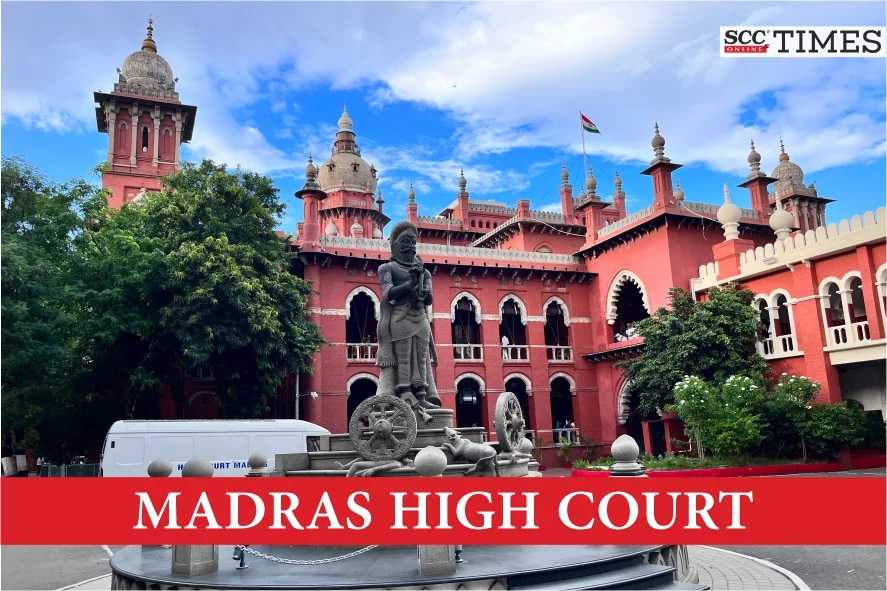Madras High Court: In a writ petition filed against the impugned Refusal Check Slip issued by the Sub Registrar and the impugned order passed by the District Registrar and consequently to direct the Sub Registrar to register the adoption deed dated 12-01-2022, G.R. Swaminathan, J. has held that the proviso to sub-section (2) of Section 9 of the Hindu Adoptions and Maintenance Act, 1956 will not apply when the mother/father of the child to be given in adoption is absent. Further, the Court said that the marital status of the woman cannot be the determining factor for giving her child in adoption. Thus, the Court set aside the impugned order, permitted the parties to re-present the document and directed the registering authority to register the same on such re-presentation subject to fulfilment of the other usual formalities.
Background:
“A” is a three-year-old male child. He was born on 28-11-2021 to “K” out of an illicit relationship. “K” was a minor when she conceived “A”. Thus, she wants to give the child in adoption. The petitioner and his wife have come forward to take “A” in adoption. Thereafter, a deed of adoption was executed and presented for registration. The registering authority refused registration on the ground that “K” had attained majority and remains unmarried at the time of giving adoption. Challenging the impugned refusal check slip, this writ petition was filed.
Analysis and Decision:
The Court took note of Section 2(1) of the Hindu Adoptions and Maintenance Act, 1956 (‘HAMA’) dealing with the application of the Act, and noted that Explanation (b) to the said provision reads that the Act will apply to any child, legitimate or illegitimate, one of whose parents is a Hindu, Buddhist, Jaina or Sikh by religion and who is brought up as a member of the tribe, community, group or family to which such parent belongs or belonged.
The Court said that in this case, “K” is a Hindu, and she has brought up “A” as a Hindu. The petitioner is also a Hindu. His wife has given consent for taking the child in adoption. Therefore, the applicability of the personal laws of Hindus is beyond dispute.
The Court also noted that Section 6 of the Hindu Adoptions and Maintenance Act, 1956 sets out the requisites of a valid adoption. One of the conditions is that the person giving in adoption has the capacity to do so.
Concerning the question whether the adoption is invalid since consent has not been obtained from the biological father of “A”, the Court said as per Section 6(b) of the Hindu Minority and Guardianship Act, 1956, in the case of a Hindu minor illegitimate boy or an illegitimate unmarried girl, the mother is the natural guardian and after her, the father.
Therefore, the Court said that “K” is competent to give her biological child “A” in adoption. The proviso to Section 9(2) of the Act will apply only if the father is around to claim paternity over the child.
The Court stated that in this case, the father has not even been identified. Thus, one should proceed on the premise that the biological father of the child is not available.
Citing the legal maxim “Lex Non Cogit Ad Impossibilia” which means Law does not compel a person to do that which he or she cannot possibly perform, the Court said that “K” cannot possibly obtain consent from the natural father of the child. Therefore, the proviso to sub-section (2) of Section 9 of Hindu Adoptions and Maintenance Act, 1956 cannot apply.
The Court relied on Githa Hariharan v. Reserve Bank of India, (1999) 2 SCC 228, wherein it was held that the word “after” need not necessarily mean “after the lifetime”. It would mean “in the absence of”, the word “absence” referring to the father’s absence from the care of the minor’s property or person for any reason whatsoever. The Court said that “A” was born on account of the illicit intimacy between “K” and “X”. “X” though alive is absent for all practical purposes in the life of “A” and it is the biological mother who is in charge of his person. In these circumstances, “K” cannot be called upon to obtain the consent of “X”.
Therefore, the Court held that proviso to sub-section (2) of Section 9 of the Hindu Adoptions and Maintenance Act, 1956 will not apply when the mother/father of the child to be given in adoption is absent in the sense laid down Githa Hariharan’s case (supra).
The Court said that “the reason given in the impugned refusal check slip betrays the patriarchal mind set of the registering authority The underlying assumption is that an unmarried woman above the age of 18 years cannot give her biological child in adoption”.
The Court said that the marital status of the woman cannot be the determining factor for giving her child in adoption as Section 9 of the Hindu Adoptions and Maintenance Act, 1956 uses the expressions “father” and “mother”. It does not use the words “husband” and “wife”. Even the proviso to sub-section (2) of Section 9 does not envisage obtaining the consent of one’s spouse, if alive.
The Court further added that it is possible that a child may be born through live-in relationship or on account of illicit intimacy. The mother may like to give the child up for adoption to ensure a proper future for the child, as the father may have abandoned his child and may not be around to assume responsibility. Thus, the reason set out in the impugned order is patently unsustainable.
[Ashok Kumar v. Inspector General of Registration, 2024 SCC OnLine Mad 2111, Order dated 13-06-2024]
Advocates who appeared in this case :
For Petitioner: Advocate T.Muhilan
For Respondents: Government Advocate R.Raghavendran






